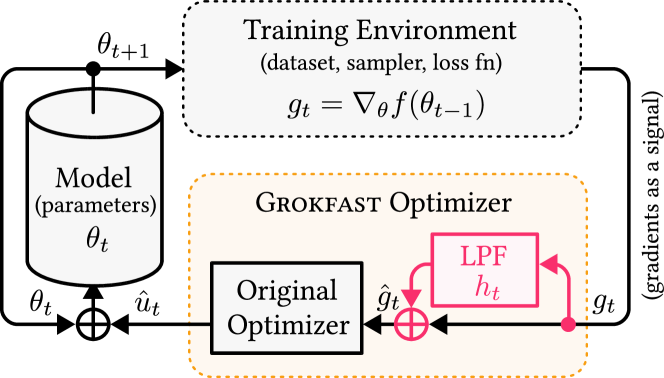Explorations into "Grokfast, Accelerated Grokking by Amplifying Slow Gradients", out of Seoul National University in Korea. In particular, will compare it with NAdam on modular addition as well as a few other tasks, since I am curious why those experiments are left out of the paper. If it holds up, will polish it up into a nice package for quick use.
The official repository can be found here
$ pip install grokfast-pytorchimport torch
from torch import nn
# toy model
model = nn.Linear(10, 1)
# import GrokFastAdamW and instantiate with parameters
from grokfast_pytorch import GrokFastAdamW
opt = GrokFastAdamW(
model.parameters(),
lr = 1e-4,
weight_decay = 1e-2
)
# forward and backwards
loss = model(torch.randn(10))
loss.backward()
# optimizer step
opt.step()
opt.zero_grad()- run all experiments on small transformer
- modular addition
- pathfinder-x
- run against nadam and some other optimizers
- see if
exp_avgcould be repurposed for amplifying slow grads
- add the foreach version only if above experiments turn out well
@inproceedings{Lee2024GrokfastAG,
title = {Grokfast: Accelerated Grokking by Amplifying Slow Gradients},
author = {Jaerin Lee and Bong Gyun Kang and Kihoon Kim and Kyoung Mu Lee},
year = {2024},
url = {https://api.semanticscholar.org/CorpusID:270123846}
}@misc{kumar2024maintaining,
title = {Maintaining Plasticity in Continual Learning via Regenerative Regularization},
author = {Saurabh Kumar and Henrik Marklund and Benjamin Van Roy},
year = {2024},
url = {https://openreview.net/forum?id=lyoOWX0e0O}
}@inproceedings{anonymous2024the,
title = {The Complexity Dynamics of Grokking},
author = {Anonymous},
booktitle = {Submitted to The Thirteenth International Conference on Learning Representations},
year = {2024},
url = {https://openreview.net/forum?id=07N9jCfIE4},
note = {under review}
}